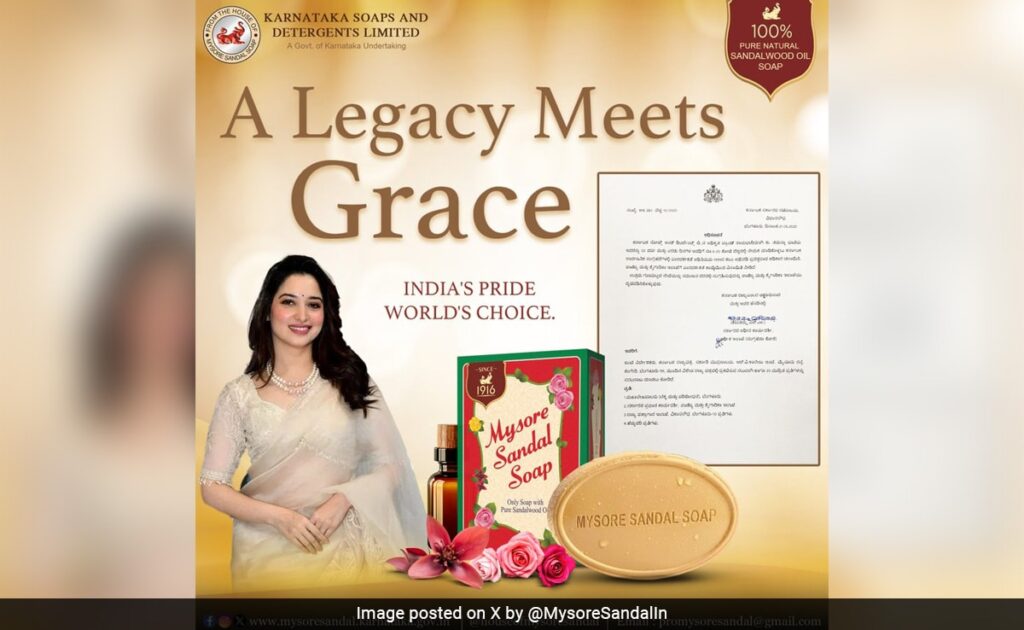
The Tamannaah-Mysore Sandal Soap saga is far more than just the latest celebrity endorsement to draw flak. It’s a textbook case of outdated marketing, a misguided pursuit of beauty ideals, and a “pan-India strategy” that spectacularly misfires by overlooking its own roots.
The KSDL’s Rs 6.2 crore bet on Tamannaah Bhatia was meant to lift Mysore Sandal Soap from the doldrums. Noble intent, perhaps. But, the justification? “Pan-India appeal,” “digital presence.” As if in 2025, consumers are swayed by follower counts over genuine connection.
This isn’t just any soap; it’s Karnataka’s own, a matter of deep regional pride. The outrage isn’t against Tamannaah – she’s merely a celebrity doing her job. It’s about us. It’s about a government-owned enterprise ignoring the profound, organic connection it already has with its people – overlooking the far more potent, organic connection a local Kannada actor or actress would bring.
In fact, many Kannada actors and actresses would have embraced this role for free, out of sheer pride for the state – just like the late Puneeth Rajkumar and I participated pro-bono for the ‘Hosa Belaku’ LED campaign.
This misstep also subtly, yet significantly, ventures into the territory of beauty standards. In an era where women globally are actively dismantling unrealistic ideals perpetuated by media – think the transformation from ‘Fair & Lovely’ to ‘Glow & Lovely’ – a government-owned entity should be a voice of reason, not an echo of dated aspirations.
Look at Dove’s campaigns, never featuring a traditional brand ambassador, but empowering normal, regular people to feel strong and beautiful in their own skin. Contrast this with the struggles of brands like Victoria’s Secret, which suffered precisely for clinging to exclusionary, aspirational beauty ideals instead of embracing reliability.
Mysore Sandal Soap, unlike a luxury product, resonates with farmers, nurses, IT professionals, and families across Karnataka; it is relatable, not aspirational. It’s about a sense of belonging and unity. Injecting a celebrity to endorse it, especially one from a different cultural sphere, risks making the brand aspirational in a way that alienates its core, diverse user base. It replaces the powerful relatability that fosters loyalty with an unattainable image, inadvertently fuelling resentment and a feeling of “not being good enough.”
And then there’s the “pan-India strategy” – often a lazy solution for innovation. For a company reportedly struggling, spending Rs 6 crore on a brand ambassador defies basic financial logic. How many soaps must be sold just to recoup that fee?
Mysore Sandal Soap is deeply ingrained in the state’s pride and legacy. It has loyalty – the kind that makes you stick by RCB through thick and thin, win or lose. You don’t need a celebrity to tell people what to buy when pride already drives the purchase. Amul understands this; they never needed a celebrity, relying on an iconic mascot and brilliant campaigns to forge a sense of national ownership. Global giants like Amazon and Apple don’t rely on faces; they rely on inherent value.
This pursuit of a “pan-India” facade, a desperate grab for external validation, feels less like a strategic revival and more like a costly eye-wash. You don’t need someone to make Karnataka’s brand pan-India. You make Karnataka itself pan-India, and Mysore Sandal Soap will follow.
In a market where even Lux fights daily for relevance, KSDL’s true strength lies in its consistency, quality, and the profound, enduring pride Kannadigas have in their soap. The intent might be there, but the execution? A fundamental misreading of everything that truly makes a brand great.
(Divya Spandana is a former Member of Parliament, and an actor and producer)
Disclaimer: These are the personal opinions of the author

